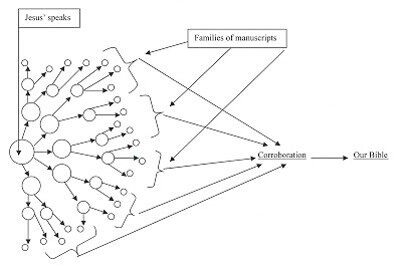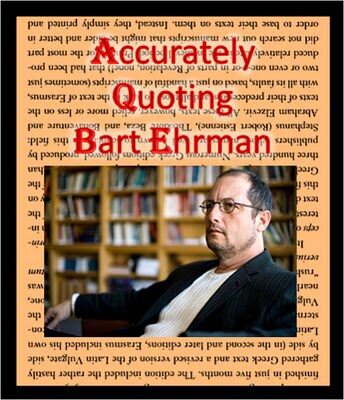As I demonstrated in the parsed essay Bart Ehrman’s Millions and Millions of Variants there are more variants in Brat Ehrman’s book Misquoting Jesus than there are words in that book. Moreover, considering that he harps on alleged contradictions in the Bible it is fascinating to note that Ehrman is a walking contradiction himself: whether it is his faithless journey, his knowledge of criticism’s of him, his historical claims, all comes with a contradiction and or a substandard double standard.
Bart Ehrman is somewhat of a self-style modern gnostic; a possessor of rare esoteric knowledge. He holds the secret to the fact that the Bible is an unreliable man-made concoction of documents, that Christianity is a farce that just happened to win a political and theological struggle to survive as the fittest theo-meme and that he is uniquely knowledgeable and capable of revealing this truth to the youth and the world at large.
Then again, he actually claims that there is a pastoral conspiracy to keep this knowledge hidden from the general populous as he claims:
pastors who go to mainline denominational seminaries…learn in their Bible classes. But when they start working in the church, it’s as if they forget it all, or they decide not to tell their parishioners about it.1
In fact, his book Jesus, Interrupted is gnostically and conspiratorially subtitled, Revealing the Hidden Contradictions in the Bible (and Why We Don’t Know About Them) and Misquoting Jesus is subtitled, The Story Behind Who Changed the Bible and Why.
In this parsed essay we will be considering various claims made by Bart Ehrman as well as further considering the Erhmanian mythos but first I thought to provide a just in case and very succinctly survey some of the background information:
There are circa 5,745 Greek manuscripts of the New Testament which range from whole to fragmentary.
There are what are known as families of manuscripts which represent manuscripts found or copied in different cities.
If we merely had various manuscripts with various variants and they differed to the point that we could not group them, the problem of variants would be deleterious and not, as it is, beneficial. But beneficial how?
The erroneous and ahistorical view:
The correct and historical view:
Let us imagine that one family of manuscripts totals 1,000 copies. Let us further imagine that each of these manuscripts misspells “corpuscle” as “corpseuscle.” This one misspelled would be counted as 1,000 variants as this one single misspelled word occurs in 1,000 copies. Now, how could we ever know what “corpseuscle” was supposed to mean? Was it something to do with “corpuscles” or something to do with “corpses”? Firstly, we would discern the meaning from the context. Secondly, we see the advantage of having families in that while this 1,000 member family reads “corpseuscle” the other families, let us imagine that they total 4,745 manuscripts agree that the reading is “corpuscle.”
It is in conducting such corroborations that we are able to iron out variants. In fact, that errors were copied time and time again within the families is evidence of the care with which they were copied. Yes, an error was made somewhere along the way but the evidence is that they were being copied reliably, meaning as is. Thus, when errors, accretions or otherwise purposeful corruptions were inserted into the text, we can find them out and keep getting ever closer to the original.
Furthermore, consider that in addition to the Greek manuscripts, there are some 8,000-10,000 Latin Vulgate manuscripts and circa 8,000 Ethiopic, Slavic, Armenian manuscripts. For a total of circa 24,000 manuscripts of the New Testament which is the most well documented ancient writing and far more reliable than any ancient work of fiction or history, certainly more reliable than any ancient work which is used in attempts to discredit it.
When corroboration is considered we conclude that the New Testament can be accurately reconstructed to what in 1980 AD Norman L. Geisler and William E. Nix quantified as “A form that is 99.5% pure”2 and which has been subsequently updated to 99.8%.
Now, let us further imagine the following: let us gather all 24,000 manuscripts and destroy them. Moreover, why not also go ahead and destroy all Bibles, all internet/computer files containing the Bible, etc. Now, let us survey the writings of the early church fathers and glean from those writings their quotations from the New Testament. We find that solely quoting from the early church fathers we are able to reconstruct the entire New Testament with the exception of a mere eleven verses (which, of course, do not affect any major doctrine).
In a previous essay on Bart Ehrman I demonstrated that there are two tales of how Bart Ehrman came to abandon Christianity and embrace agnosticism. One is the tale of the heroic skeptic who was a Christian but later, based solely on unbiased scholarship spiked with personal academic integrity, followed the evidence where it lead and was forced by the weight of the evidence to conclude that the Bible and Christianity were fallacious.
The other tale is the true story which is that Ehrman concocted his own personal theology which is so orthodox and authoritative that it cannot be toppled by logic or theologic and whereby, peppered by personal subjective experiences, he made an emotionally based choice to reject the Bible and its God.
The first version, the scholar’s version, is succinctly stated as follows:
I was a born-again Christian in high school and I went off to a fundamentalist Bible college…I went to Princeton Theological Seminary…started finding what my professors had said, that there were discrepancies in the Bible, contradictions…my view of scripture started changing drastically…historical information affected me personally and affected my faith journey.3
Ehrman clarifies:
if your faith is rooted in a belief in the Bible, in a literal understanding of the Bible, and that gets taken away from you, then what do you have left? You either have to change the way you believe or you have to give up your belief.
What happened in my case is I actually didn’t give up my belief because of any of this…what led me to leave the faith, [was] not my change in my views of the Bible.4
the problems of the Bible are not what led me to leave the faith.5
So what did cause it? It was a mixture of personal experiences such as when a Christian youth leader visited his father as he was dying of cancer in a hospital,
The youth leader used a bottle of hotel shampoo to “anoint” his father, and tried to persuade his father to confess specific sins, Ehrman says. Ehrman says he was angry at the minister for acting “self-righteous” and “hypocritical.”6
While we must be empathetic to the fact of this very emotionally charged situation it is also important to ascertain what Bart Ehrman was rejecting and or rebelling against. For example, James 5:14 states that if someone is sick the elders should pray for them and anoint them with “oil” (elaion in the Greek) and not with shampoo. Also, considering texts such as 1st John 1:9 stated that “If we confess our sins, He is faithful and just to forgive us our sins, and to cleanse us from all unrighteousness” I am not certain whence came the anger.
Moreover, it is a non sequitur to conclude that the minister was “acting ‘self-righteous’ and ‘hypocritical’” as persuading the confession of sins in no way implies that the person doing the persuading considers themselves somehow morally or spiritually superior—although, perhaps “specific sins” is supposed to point towards something specific which we simply cannot discern from this succinct explanation.
Now, let us come to the root of the matter which is that Bart Ehrman became such as fundamentalist theologian that he could let nothing topple his particular self-authored dogma. I am not referring to him becoming a Christian “fundie” but that he invented a theology about what God would, should, could, and would not, should not, and could not do and would let no other logic or theologic trouble his:
My understanding of the Bible changed and I became a kind of mainstream, mainline, liberal Christian who thought the Bible had discrepancies but I still believed in God and still believed Christ was the Son of God and still believed in his death for salvation and all those things.
The reason I became an agnostic is unrelated to this material…how I actually lost my faith, which was related to my problem believing that there could be a good God in control of this world given the state of things, given all the suffering and pain in the world. That’s what led me to leave the faith, not my change in my views of the Bible.7The problem of suffering has haunted me for a very long time…Ultimately, it was the reason I lost my faith…
I could no longer explain how there can be a good and all-powerful God actively involved with this world, given the state of things. For many people who inhabit this planet, life is a cesspool of misery and suffering. I came to a point where I simply could not believe that there is a good and kindly disposed Ruler who is in charge of it.8
Having dealt with the problem of evil variously (see the relevant portions here, here, here, here and here, to name a few) I wanted to focus on what I meant by Ehrman’s theology since this is something which I have noticed of atheists as well. They concoct their very own theologies to the affect of: if God was then God would/could/should _____________ (fill in the blank); since we do not notice that _____________ (fill in the blank) occurs, then God is not. In Bart Ehrman’s case it was; if God was then God would/could/should not allow any evil—such as rejecting God and the Bible and urging others to do likewise—since we notice that evil occurs, then God is not.
Now, just to clarify; he claims to be an agnostic, stating, “I’m not an atheist myself”9 partly because “I don’t ‘know’ if there is a God”10 and conversely he does not know if there is not one. This means that he cannot positively affirm nor deny God’s existence and is therefore an agnostic. Lesson to be learned is that the majority of New Atheist styled atheists today are agnostics but do not know it, do not realize it, will not admit it, or what have you. This much Bart Ehrman got right (see, History of Atheism for details on this issue).
Back the Ehrmanian school of dogmatic theology: whether his problem of evil argument makes perfect sense to you or not, the bottom line fact is that it is a theological position, one that he (and others) have invented and one that they consider so authoritative that they do not allow it to be toppled by anything.
~~~~~~~~~~~~~~~~~~~~~~~~
A plea: I have to pay for server usage and have made all content on this website free and always will. I support my family on one income and do research, writing, videos, etc. as a hobby. If you can even spare $1.00 as a donation, please do so: it may not seem like much but if each person reading this would do so, even every now and then, it would add up and really, really help. Here is my donate/paypal page.
Due to robo-spaming, I had to close the comment sections. However, you can comment on my Facebook page and/or on my Google+ page.



